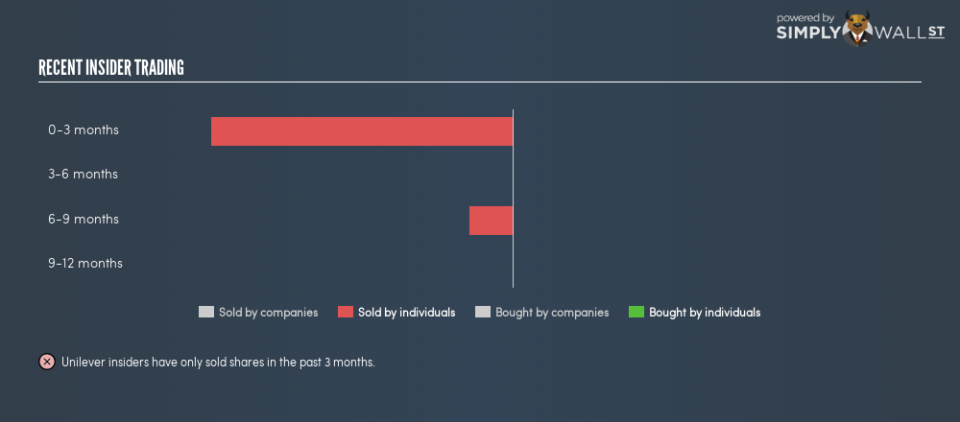Should You Be Worried About Insider Transactions At Unilever PLC (LON:ULVR)?

Want to participate in a short research study? Help shape the future of investing tools and you could win a $250 gift card!
We often see insiders buying up shares in companies that perform well over the long term. On the other hand, we’d be remiss not to mention that insider sales have been known to precede tough periods for a business. So before you buy or sell Unilever PLC (LON:ULVR), you may well want to know whether insiders have been buying or selling.
What Is Insider Buying?
It is perfectly legal for company insiders, including board members, to buy and sell stock in a company. However, rules govern insider transactions, and certain disclosures are required.
We don’t think shareholders should simply follow insider transactions. But logic dictates you should pay some attention to whether insiders are buying or selling shares. For example, a Columbia University study found that ‘insiders are more likely to engage in open market purchases of their own company’s stock when the firm is about to reveal new agreements with customers and suppliers’.
See our latest analysis for Unilever
The Last 12 Months Of Insider Transactions At Unilever
In the last twelve months, the biggest single sale by an insider was when Douglas Baillie sold UK£466k worth of shares at a price of UK£40.14 per share. That means that even when the share price was below the current price of UK£42.49, an insider wanted to cash in some shares. While sellers have a variety of reasons for selling, this isn’t particularly great to see. We generally consider it a negative if insiders have been selling on market, especially if they did so below the current price. Please note, however, that this single sale was just 12.7% of Douglas Baillie’s stake.
Over the last year, we note insiders sold 13.26k shares worth UK£534k. In total, Unilever insiders sold more than they bought over the last year. The sellers received a price of around €40.24, on average. We don’t gain much confidence from insider selling near the recent share price. While some insiders have decided to take some money off the table, we wouldn’t put too much weight on this fact. The chart below shows insider transactions (by individuals) over the last year. If you want to know exactly who sold, for how much, and when, simply click on the graph below!
If you are like me, then you will not want to miss this free list of growing companies that insiders are buying.
Insiders at Unilever Have Sold Stock Recently
Over the last three months, we’ve seen significant insider selling at Unilever. In total, Douglas Baillie sold €466k worth of shares in that time, and we didn’t record any purchases whatsoever. This may suggest that some insiders think that the shares are not cheap.
Insider Ownership of Unilever
Looking at the total insider shareholdings in a company can help to inform your view of whether they are well aligned with common shareholders. Usually, the higher the insider ownership, the more likely it is that insiders will be incentivised to build the company for the long term. Insiders own 0.02% of Unilever shares, worth about UK£27m. While this is a strong but not outstanding level of insider ownership, it’s enough to indicate some alignment between management and smaller shareholders.
What Might The Insider Transactions At Unilever Tell Us?
An insider hasn’t bought Unilever stock in the last three months, but there was some selling. Looking to the last twelve months, our data doesn’t show any insider buying. On the plus side, Unilever makes money, and is growing profits. Insiders own shares, but we’re still pretty cautious, given the history of sales. We’re in no rush to buy! Of course, the future is what matters most. So if you are interested in Unilever, you should check out this free report on analyst forecasts for the company.
If you would prefer to check out another company — one with potentially superior financials — then do not miss this free list of interesting companies, that have HIGH return on equity and low debt.
To help readers see past the short term volatility of the financial market, we aim to bring you a long-term focused research analysis purely driven by fundamental data. Note that our analysis does not factor in the latest price-sensitive company announcements.
The author is an independent contributor and at the time of publication had no position in the stocks mentioned. For errors that warrant correction please contact the editor at editorial-team@simplywallst.com.

